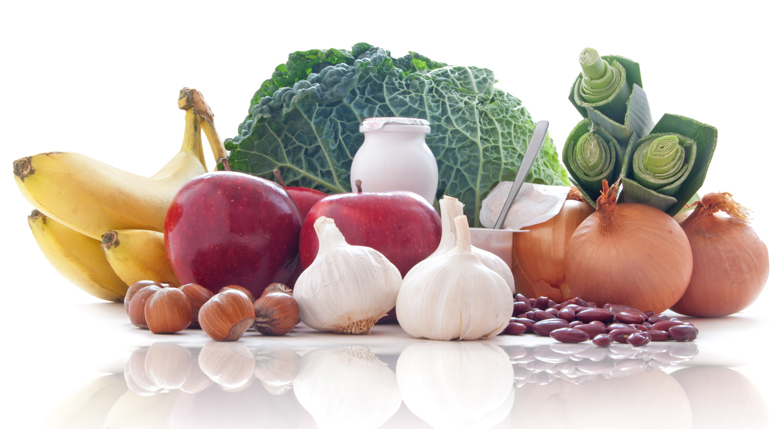
PROBIOTICS are live beneficial bacteria that are naturally created by the process of fermentation in foods like yogurt, sauerkraut, miso soup, kimchi, and others.
Probiotics are also available in pill form and as an added ingredient in products like yogurt and health drinks.
PREBIOTIC FIBER is a non-digestible part of foods like bananas, onions and garlic, Jerusalem artichoke, the skin of apples, chicory root, beans, and many others. Prebiotic fiber goes through the small intestine undigested and is fermented when it reaches the large colon.
This fermentation process feeds beneficial bacteria colonies (including probiotic bacteria) and helps to increase the number of desirable bacteria in our digestive systems (also called the gut) that are associated with better health and reduced disease risk.
Benefits of PROBIOTICS
The beneficial effects of probiotics have been widely demonstrated. [Toscana 2016] Health professionals often recommend probiotics in supplement form to patients on antibiotics in an attempt to repopulate the colon with desirable bacteria after the course of antibiotics has wiped out both beneficial and undesirable bacteria. [Hyman 2016]
Some find taking probiotics can combat gastrointestinal side effects of the medication and reduce the bacterial growth leading to yeast infections.
Since each body is different, it is necessary to determine which probiotics will be helpful to one’s own system. [Laurence 2018] In addition, it is important to make sure the bacteria in probiotic supplements are alive. Probiotic bacteria are fragile and can easily be killed by stomach acid, time, and heat.
Benefits of PREBIOTICS
Researchers have found that prebiotics are helpful in increasing the helpful bacteria already in the gut that reduce disease risk and improve general well being. [Florowska 2016] Prebiotic fiber is not as fragile as probiotic bacteria because it is not affected by heat, stomach acid, or time. Nor does the fermentation process differ depending on the individual.
Scientific Literature suggests that increasing prebiotic fiber intake supports immunity, digestive health, bone density, regularity, weight management, and brain health.
Why take supplements when we can eat fiber-rich and fermented foods?
It is clearly vital to nourish a healthy bacterial mix in the colon. We can start with a foundation of healthy eating, focusing on fresh, organic vegetables and fruits, while avoiding processed food products and sugary foods and drinks.
However, it is sometimes difficult with a typical modern diet that includes processed foods and high amounts of sugar and synthetic ingredients to eat enough fermented foods and foods high in fiber. Therefore, adding supplements may be a healthy addition to one’s diet.
Suggested Fiber Amounts*
- Dietary fiber: 25-38g
- Prebiotic fiber: 5g-20g
* From the International Scientific Association for Probiotics and Prebiotic
Average amounts of total dietary fiber actually consumed daily: 15-18 grams per day
(according to USDA statistics: https://www.ars.usda.gov/)
